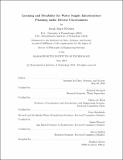Learning and flexibility for water supply infrastructure planning under diverse uncertainties
Author(s)
Fletcher, Sarah Marie
DownloadFull printable version (5.050Mb)
Other Contributors
Massachusetts Institute of Technology. Institute for Data, Systems, and Society.
Advisor
Kenneth Strzepek.
Terms of use
Metadata
Show full item recordAbstract
Water supply infrastructure planning faces many uncertainties. Uncertainty in short-term in rainfall and runoff, groundwater storage, and long-term climate change impacts water supply forecasts. Population and economic growth drive urban water demand growth at rapid but uncertain rates. Overbuilding infrastructure can lead to expensive stranded assets and unnecessary environmental impacts, while under building can cause reliability outages with impacts on the economy, ecosystems, and human health. This dissertation assesses the potential for Bayesian learning about uncertainty to enable flexible, adaptive approaches in which infrastructure can be changed over time to reduce cost risk while achieving reliability targets. It develops a novel planning framework that: 1) classifies uncertainties and applies appropriate, differentiated uncertainty analysis tools, 2) applies Bayesian inference to physical models of hydrology and climate to develop dynamic uncertainty estimates, and 3) uses stochastic dynamic programming and engineering options analysis to assess the value of flexibility in mitigating cost and reliability risk. This framework is applied to three applications. Chapter 3 evaluates the potential for modular desalination design to manage multiple, diverse uncertainties -- streamflow, demand growth, and the cost of water shortages -- in Melbourne, Australia. Chapter 4 addresses uncertainty in groundwater resources in desalination planning in Riyadh, Saudi Arabia, and Chapter 5 addresses model uncertainty in climate change projections in a dam design problem in Mombasa, Kenya. Across all three applications, we find value in flexible infrastructure planning with a 9-28% reduction in expected cost. However, the performance of flexible approaches compared to traditional robust approaches varies considerably and is influenced by technology choice, economies of scale, discounting, the presence of irreducible stochastic variability, and the value society places on water reliability.
Description
Thesis: Ph. D. in Engineering Systems, Massachusetts Institute of Technology, School of Engineering, Institute for Data, Systems, and Society, 2018. This electronic version was submitted by the student author. The certified thesis is available in the Institute Archives and Special Collections. Cataloged from student-submitted PDF version of thesis. Includes bibliographical references (pages 151-163).
Date issued
2018Department
Massachusetts Institute of Technology. Engineering Systems Division; Massachusetts Institute of Technology. Institute for Data, Systems, and SocietyPublisher
Massachusetts Institute of Technology
Keywords
Institute for Data, Systems, and Society.